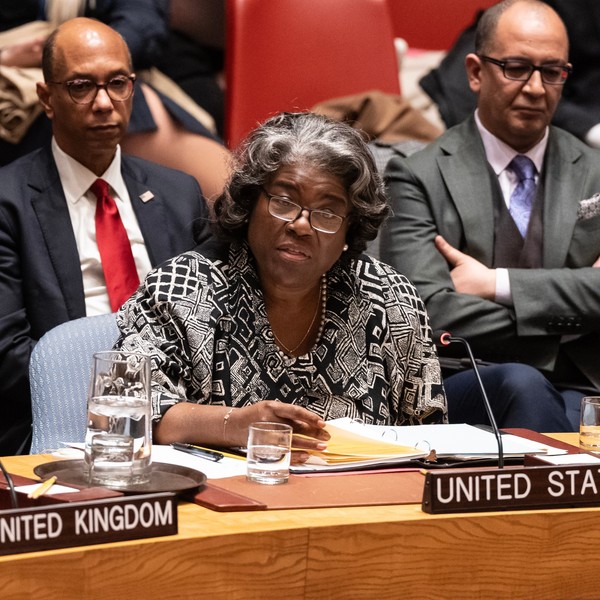UPDATE, FEB. 5: The U.S. military shot down the Chinese balloon floating over the continental U.S. on Saturday, which Washington confirmed was a surveillance balloon and not a civilian aircraft used for meteorological purposes, as claimed by the Chinese government. A F-22 fighter plane shot down the balloon with an AIM-9X Sidewinder missile when it was over the coast of South Carolina for safety purposes. The Chinese foreign ministry responded Sunday morning by calling it a "clear overreaction and a serious violation of international practice.”
This morning, Secretary of State Antony Blinken postponed a long-awaited trip to China in response to the sighting of an alleged Chinese surveillance balloon over American territory.
Despite Pentagon assurances that the balloon poses “no risk to commercial aviation, military assets or people on the ground,” members of Congress used the incident to hype fears about China. “It is a threat right here at home. It is a threat to American sovereignty, and it is a threat to the Midwest — in places like those that I live in," said House China Select Committee Chairman Mike Gallagher (R-Wis.).
“A big Chinese balloon in the sky and millions of Chinese TikTok balloons on our phones,” tweeted Sen. Mitt Romney (R-UT). “Let’s shut them all down.”
Foreign surveillance of sensitive U.S. sites is not a new phenomenon. “It’s been a fact of life since the dawn of the nuclear age, and with the advent of satellite surveillance systems, it long ago became an everyday occurrence,” as my colleague and former CIA analyst George Beebe puts it.
U.S. surveillance of foreign countries is likewise quite common. Indeed, great powers gathering intelligence on each other is one of the more banal and universal facts of international relations. Major countries even spy on their own allies, as when U.S. intelligence bugged the cellphone of German Chancellor Angela Merkel.
Typically, even when such surveillance is directed against the United States by a rival power, it does not threaten the safety of Americans and it poses manageable risks to sites where secrecy is of the utmost importance. However — in the context of rapidly increasing U.S.–China tensions — foreseeable incidents like these can quickly balloon into dangerous confrontations.
In such a situation, interested parties recast the banal and universal behaviors of all major states as a uniquely sinister characteristic of the antagonist alone. Commentators scream about the perfidy of the other, politicians call for confrontation, and these one-sided attacks are used to whip up popular nationalism.
Thus the meltdown in Washington over the Chinese balloon risks becoming a self-fulfilling prophecy: scaremongering over a manageable threat will speed the rush into destructive confrontation with China, turning what was once an everyday occurrence into a major danger.
One need look no further than the 2001 Hainan Island incident, in which a U.S. spy plane off the coast of China collided with a Chinese military jet, to imagine what is at stake today. That collision resulted in the loss of the Chinese pilot and the unauthorized emergency landing of the U.S. spy plane on Chinese territory. The crew was then taken into Chinese custody and held for 10 days until the diplomatic incident could be resolved with Washington delivering a letter expressing regret and sorrow.
As the Hainan incident demonstrated, the moments of highest tension are precisely those when diplomacy is most essential. Face-to-face discussion between U.S. and Chinese leaders is badly needed to ensure that these incidents are carefully managed and contained. Yet the toxic politics predominating in Washington seems to have convinced the Biden administration to further restrict communications with Beijing by calling off Blinken’s trip.
Bowing before the pressure of hawks in Washington who routinely inflate the threat China poses to America’s security will only embolden them to speed the cycle of rising hostility between Beijing and Washington. As more and more interests — from weapons contractors to monopolistic corporations to supporters of infrastructure investment — take advantage of great power animus to advance their agendas, the room for a more realistic relationship with China will close ever further. The United States will find itself trapped in an over-militarized approach toward the challenges posed by China’s rise, channeling the American people’s talent and resources into international conflict rather than tackling truly existential challenges like climate change, pandemic disease, and global growth and financial stability.
Letting war hawks set America’s agenda on China can only end in disaster. Conflict is not inevitable, but avoiding a disastrous U.S.–China military confrontation will require tough-minded diplomacy — not disengagement.















